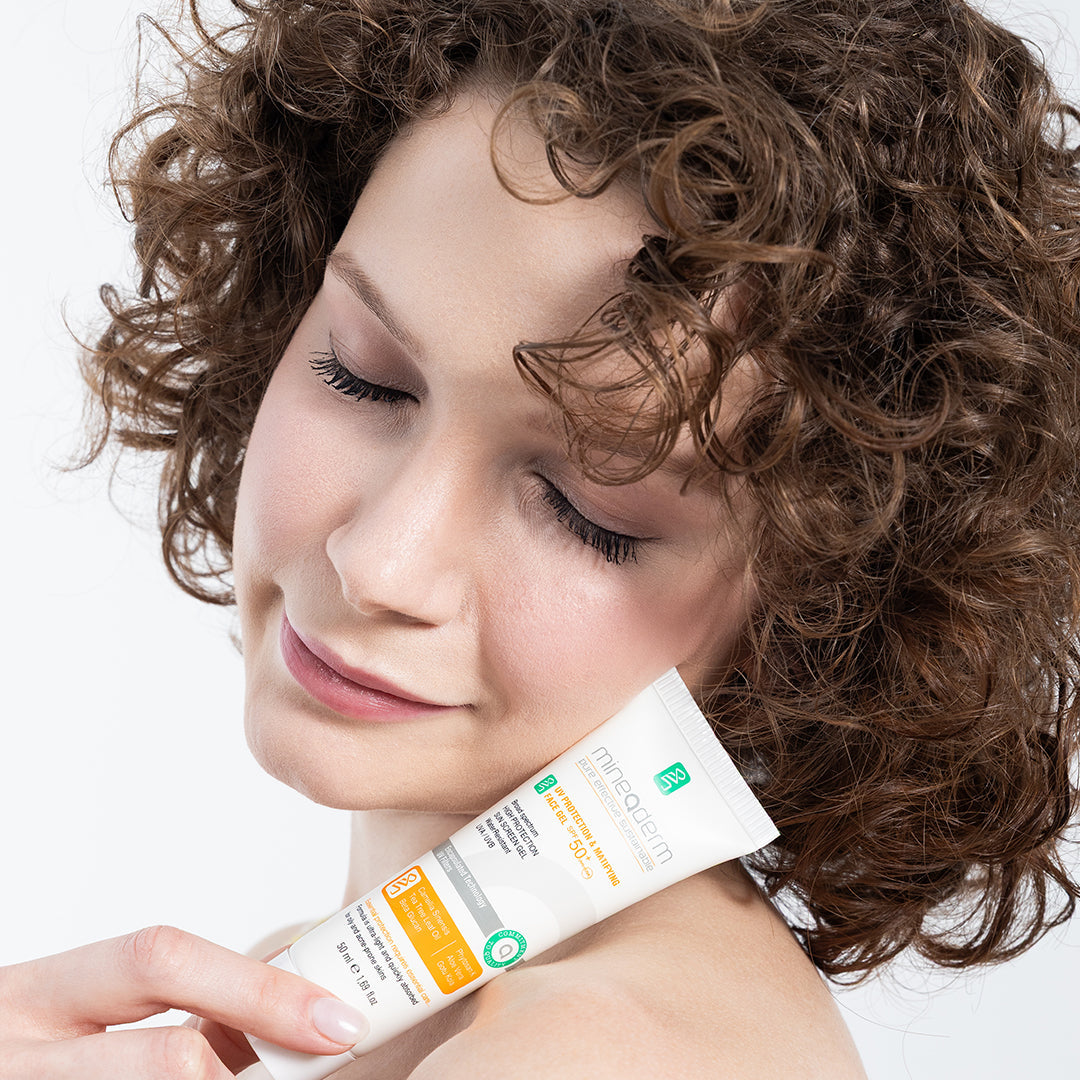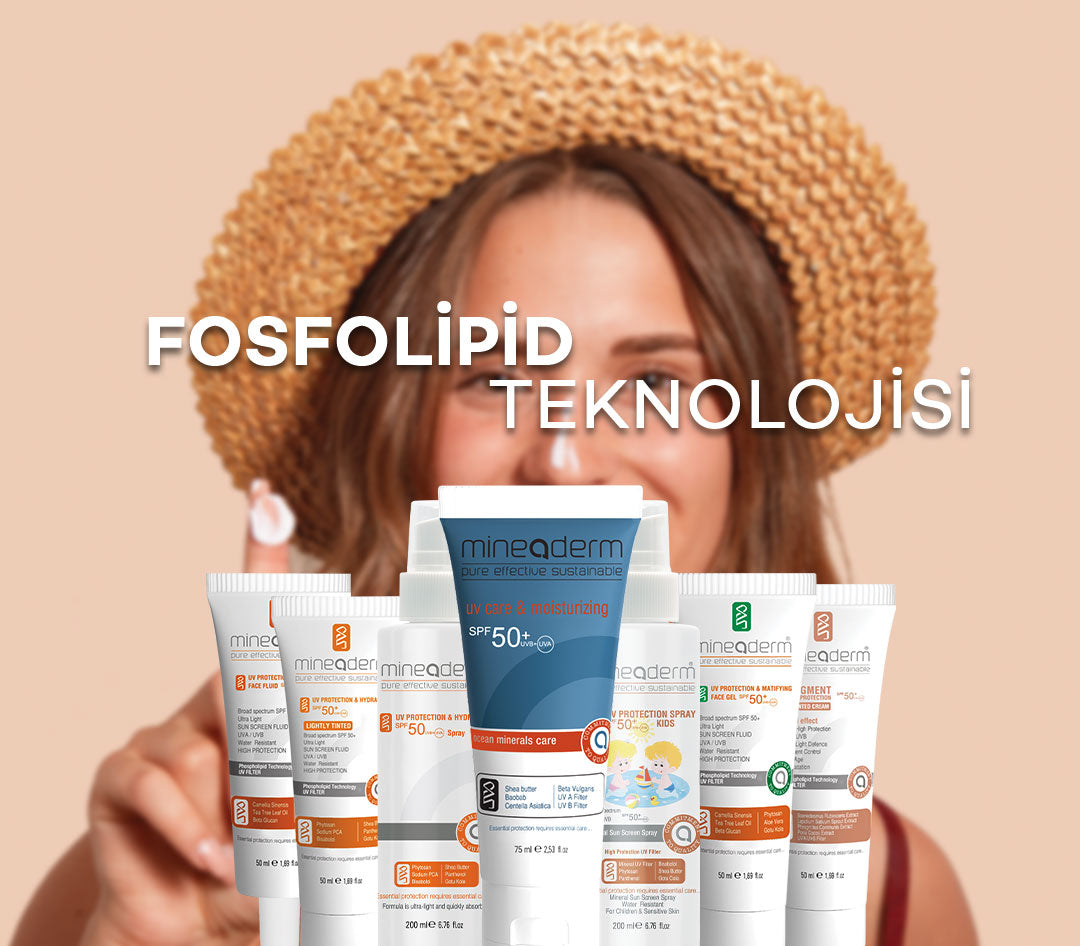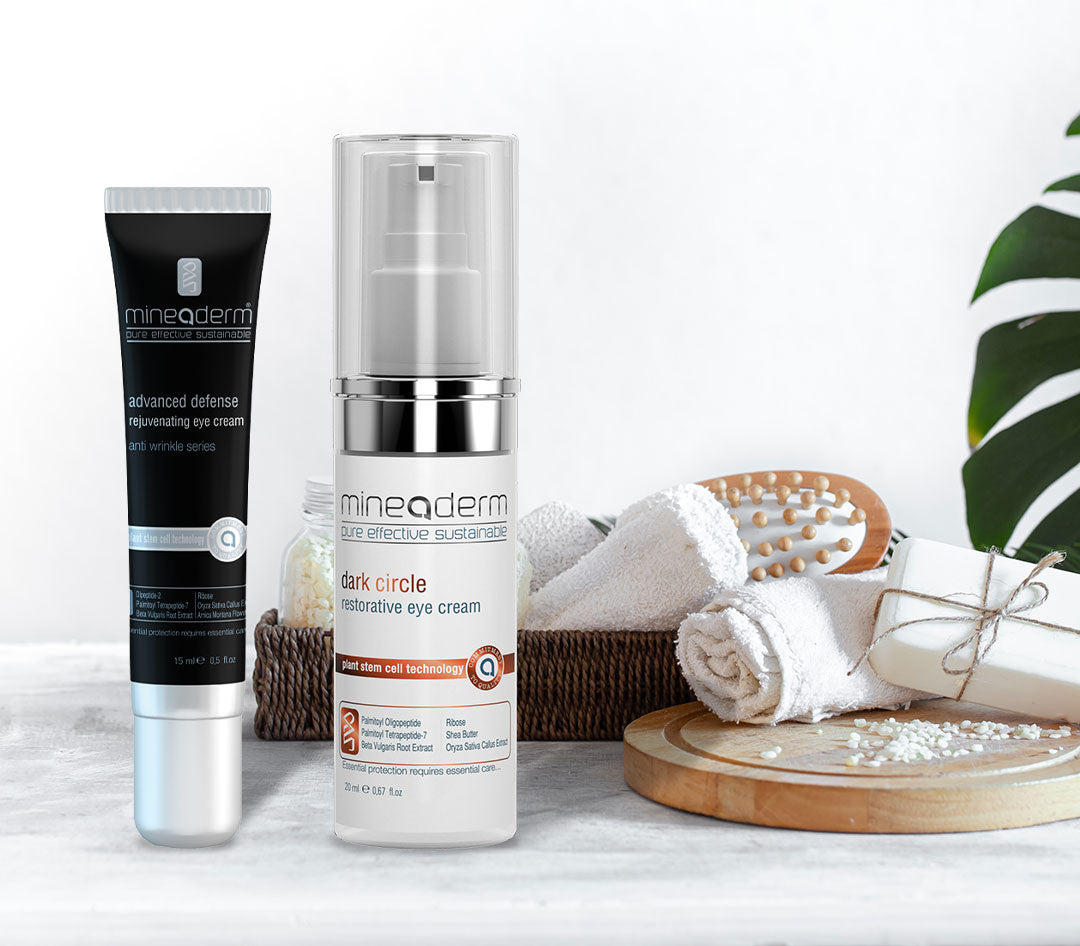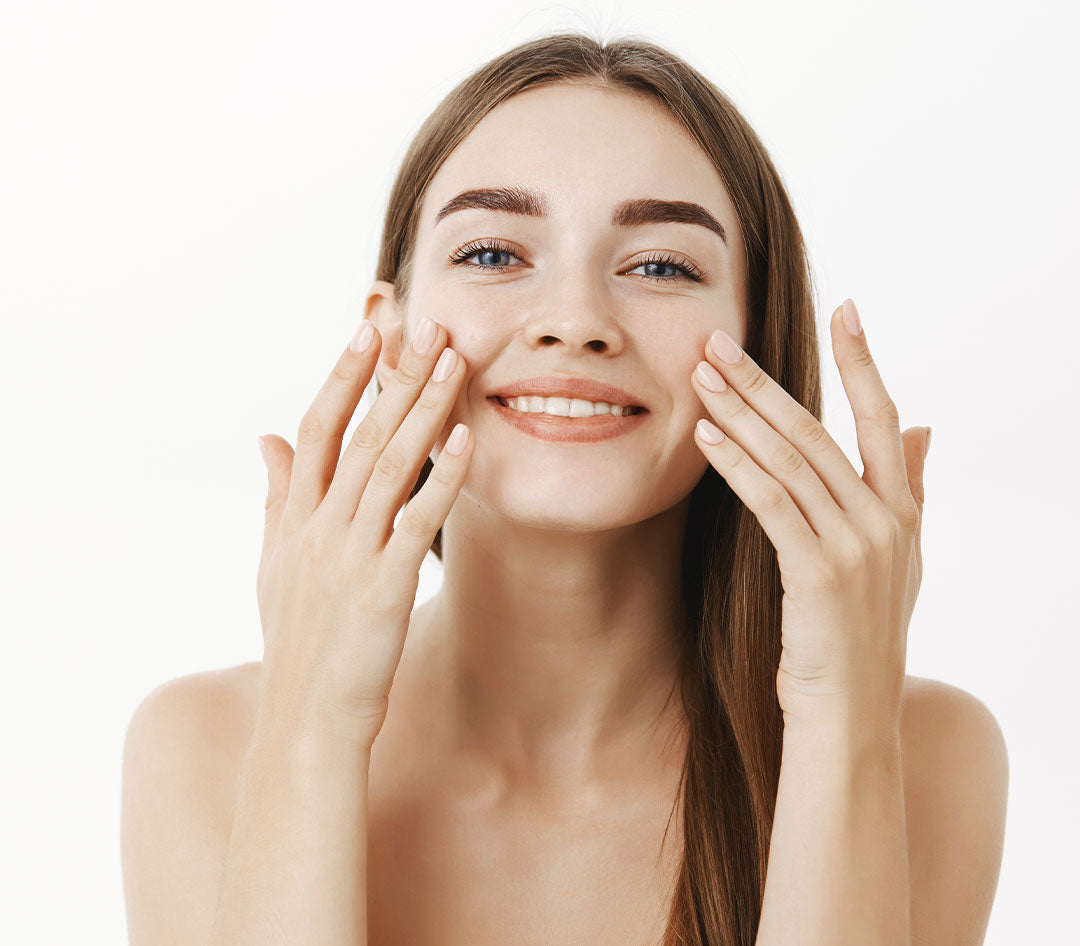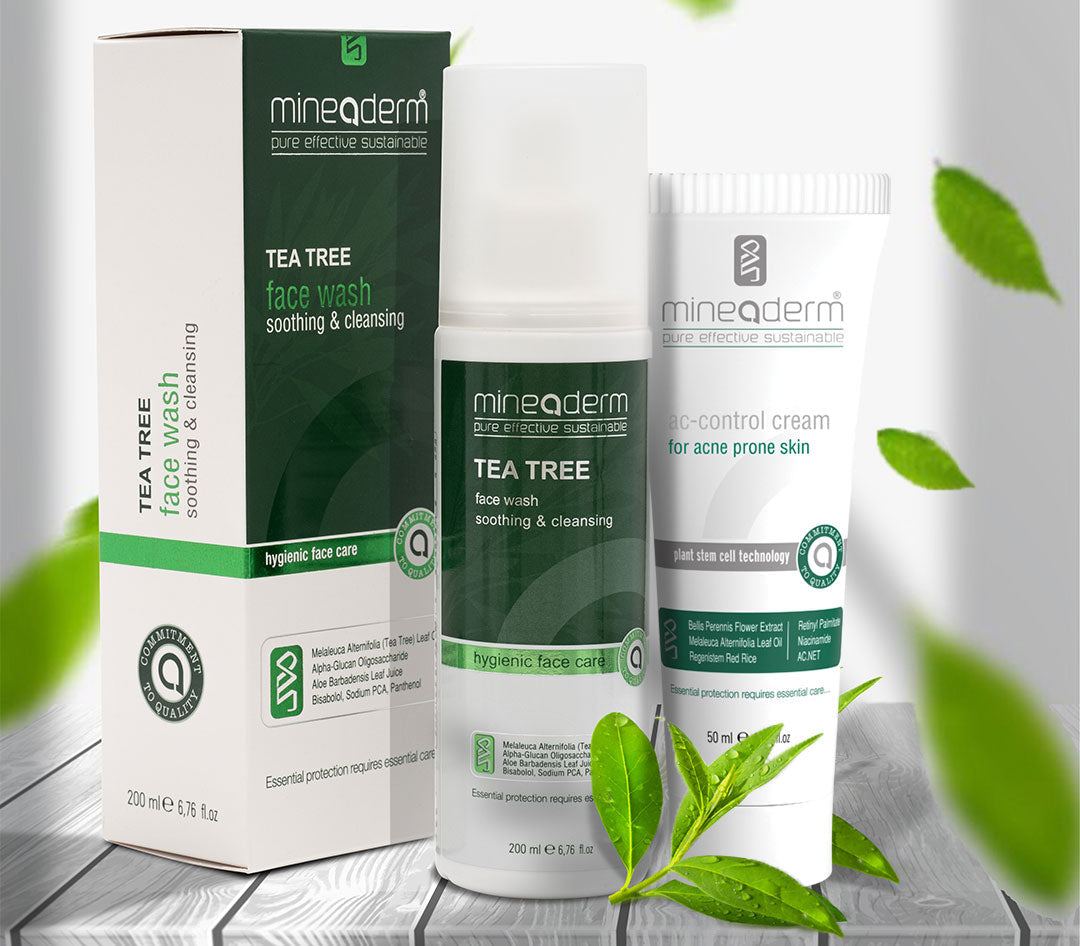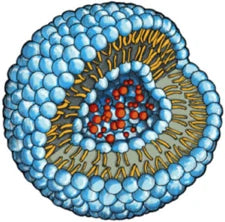News
HOW TO CHOOSE THE RIGHT SUNSCREEN? FILTERS, FACTS, AND MINEADERM’S SCIENTIFIC APPROACH
HOW TO CHOOSE THE RIGHT SUNSCREEN? FILTERS, FACTS, AND MINEADERM’S SCIENTIFIC APPROACH Facts and Misconceptions About Sunscreens: A Conscious Stance Against the Sun with Mineaderm Using sunscreen is no longer just part of a summer vacation; it has long become an essential part of a healthy skincare routine. However, choosing the right product can be confusing. It’s easy to get lost in social media questions like “natural or chemical?”, “are filters harmful?”, “will my skin be able to breathe?” At Mineaderm, our goal is to be a clear, scientific, and skin-friendly voice amid this information overload. We address sun protection without confusion, while never losing sight of its importance. “Chemical or Natural?”: Let’s Look at It Differently The word chemistry might sound too laboratory-like. Yet water is a chemical, and so is oxygen. So being “chemical” doesn’t mean something is bad; what matters is how your skin tolerates it. For sunscreen filters, the key isn’t their names—it’s how they work and how they interact with the skin. Types of Sunscreen Filters: Differences Between Physical and Chemical Filters ☀️ Physical (Mineral) Filters Work by reflecting UV rays off the skin. Formulated with ingredients like zinc oxide and titanium dioxide. Generally well-tolerated on sensitive skin. 🔬 Chemical (Organic) Filters Absorb UV rays and neutralize them by converting them into heat. Can be more transparent and lighter in texture. Begin working within minutes after application. Which is better? The answer depends on your skin. Some skin types prefer physical filters, while others find chemical filters more comfortable. The key is knowing your skin and choosing accordingly. What Does Mineaderm Do? It Finds the Balance Mineaderm sunscreens combine both physical and chemical filters in a skin-compatible way. Our goal is not only to provide high protection but also to offer a lightweight, comfortable, and reliable experience on the skin. 🧴 Our Products: Offer broad-spectrum protection against UVA and UVB rays, Support skin comfort with advanced filter technologies, Maintain performance throughout the day thanks to photostable formulations, Are designed with skin-compatible formulas suitable for daily use. Mineaderm’s skin-centered approach leverages scientific data and the latest technological solutions when selecting ingredients. Every formula is designed to combine effective protection with a caring, pleasant feeling on the skin. Beyond Labels: Focus on the Ingredients Terms like “natural,” “organic,” or “clean ingredients” may sound appealing but sometimes are just marketing slogans. Mineaderm’s mission is to focus on ingredients beyond the labels. Our products’ ingredients are carefully selected considering skin sensitivities and user expectations. We clearly explain what each ingredient does because informed choices start with accurate knowledge. Conclusion: Protect Wisely and Fearlessly Protecting your skin from the sun is a crucial step in supporting skin health. You don’t need a magical product; a sunscreen formulated with the right filters that meets your skin’s needs is enough. “The best” can vary for everyone; what matters is knowing what you are using to protect your skin. Mineaderm offers balanced and reliable sun protection solutions developed with this understanding. And yes… your skin will thank you 🙂 Explore Mineaderm’s full range of sunscreens and discover the formula that suits your skin best by visiting our product page.
Learn moreWHAT ARE PLANT STEM CELLS? THEIR BENEFITS FOR THE SKIN AND MINEADERM’S APPROACH
WHAT ARE PLANT STEM CELLS? THEIR BENEFITS FOR THE SKIN AND MINEADERM’S APPROACH What Are Stem Cells and How Do They Work? Over time, environmental factors, stress, sun exposure, and aging can have damaging effects on the skin. When the skin starts to lose its vitality and resilience, its capacity for renewal decreases. At this point, stem cells—a topic that the scientific community has long studied—come into play. Stem cells are special cells capable of repairing and regenerating tissues in living organisms. Plants have a similar system. When a plant is damaged, these cells become active and begin repairing the tissue. Because of this property, plant stem cells have recently emerged as a notable natural resource in skincare. The Role of Plant Stem Cells in Cosmetics Plant stem cells are derived from plants that show high resistance to environmental stress factors. These cells are produced by multiplying a very small tissue sample from the plant in a laboratory setting. This method ensures that: The same plant does not need to be repeatedly harvested from nature Plant resources are preserved, enabling sustainable production Ingredients can be formulated in a more stable and reliable way Plant stem cells are widely used not only in skincare but also in hair care, body care formulations, and biotechnological research. Their main purposes include: Strengthening the skin’s support systems Providing protection against oxidative stress Supporting cellular renewal processes Effects on the Skin: Supported by Scientific Evidence Research indicates that plant stem cells have the potential to: Increase skin elasticity Reduce the appearance of fine lines Improve overall skin texture These benefits are particularly noticeable in skin that experiences moisture loss, looks dull, or shows signs of aging. However, as with any active ingredient, effects may vary depending on frequency of use, skin type, and the product formulation. Use of Plant Stem Cells in Mineaderm Products Mineaderm approaches plant stem cell technology with a scientific foundation during product development. The stem cell ingredients used: Help maintain the skin’s natural balance Support the skin barrier Provide protective effects against external factors Are formulated to strengthen skin structure Some Mineaderm products also include the ACB Rice Bioferment ingredient, which reflects this approach. Derived from rice and produced using stem cell-based fermentation technology, this ingredient: Supports skin moisture balance Offers skin tone evening and brightening effects Facilitates absorption and enhances efficacy Mineaderm formulations are designed with high skin tolerance in mind, aiming for long-term, safe use. Science-Backed Natural Beauty Scientific research on stem cell technology continues to advance every year. These powerful plant-derived ingredients hold a strong position among nature-based, scientifically supported skincare solutions. Regular use and a patient approach are important for users who want to benefit from these ingredients. Renew Your Skin with Mineaderm 🌿 Explore Mineaderm products developed with plant stem cell technology on our product page.
Learn moreJuly 3 – World No Plastic Bag Day
Mineaderm – Science-Driven Beauty, Nature-Conscious Approach July 3: World No Plastic Bag Day – A Journey That Begins with Awareness Celebrated every year on July 3, World No Plastic Bag Day is an important reminder to listen to nature’s quiet yet powerful call. At Mineaderm, we hear this call too, integrating our scientific approach with respect for nature and taking decisive steps toward a more sustainable future. Single-Use Plastics: The Silent Threat Plastic bags are a serious environmental problem, remaining in nature for hundreds of years without decomposing, harming ecosystems, and indirectly affecting our health. From plastics accumulating in oceans to microplastics entering the soil and the destruction of natural habitats, the crisis is invisible yet tangible. Mineaderm takes a conscious stand against this unseen threat. Not an Obligation, but a Conscious Choice For us, environmental responsibility is not a duty—it is a conscious choice embedded in our brand’s DNA. Mineaderm manages this process voluntarily, with genuine awareness. This approach influences both our brand culture and individual habits, motivating us daily to rethink and do better. Zero Waste Certification Is Just the Beginning Yes, Mineaderm holds a Zero Waste Certificate. But we see this not as an endpoint, but as the starting point of our sustainability journey. At our production facilities, we sort waste, improve recycling systems, and invest in environmentally conscious production processes. More importantly, we cultivate this awareness together with our entire team. Resources Are Not Infinite, the Future Cannot Wait We recognize the value of raw materials sourced from nature in the cosmetics industry. But no extract or ingredient is limitless. That’s why Mineaderm goes beyond merely taking from nature—we prioritize giving back and making sustainability possible through biotechnological solutions. We combine our scientific expertise with environmental responsibility. July 3: More Than Just a Day For us, July 3 is not merely symbolic; it is a reminder to rethink every link in our value chain. Avoiding plastic bags means reimagining every step—from production to packaging, from consumption to recycling. Mineaderm is ready to fulfill its role in this transformation. Mineaderm’s Promise for the Future Choosing to forego plastic bags today is a step toward more eco-friendly formulations tomorrow. At Mineaderm, we believe that environmental awareness grows sincerely, through science and community consciousness. We are proud to be part of this transformation. AUTHOR: NAİLE KUL ŞAHİN
Learn moreSkin that Provides High Absorption with Phospholipid Technology
Phospholipid Technology New Generation Sun Protection System It is aimed to increase the solubility of sunscreen chemical raw materials by encapsulating them with phospholipid (w/o/w) and to reduce the usage concentrations of chemical filters by providing better spreading on the skin surface with this technology. One of the difficulties in the design of sunscreen formulations is phase separation problems. New formulation designs have been made to reduce the appearance of dense white layer on the skin surface after application caused by high amounts of sunscreen filters. Thanks to its long shelf life, the SPF value remains on the skin surface and provides protection against UV for up to 6 hours (or more). Perfect, smooth skin coverage, sun protection. Provides maximum protection, Less sun spots. Since it provides homogeneous protection, there is a decrease in regional ringing. It is non-greasy, non-sticky and easily tolerated by the skin. Allows the skin to breathe. Since it does not dissolve in water, its irritation feature is at a minimum level and its protection feature does not change for a long time.
Learn moreIntensive Care Series Against Eye Contour Problems
Eye Area Fights against under-eye bags and dark circles. 70% of volunteer participants showed improvement. Supports the reduction of under-eye bags, puffiness and dark circles.
Learn moreHow to Apply a Holistic Approach to Skin Care?
Holistic approach to skin care A holistic approach to skin care means taking full care of your skin in all its aspects. With a holistic approach that is part of your daily skin care routine, everyone can have healthy and naturally glowing skin! It cares for your skin from the inside and outside with a more lasting effect. A holistic approach to skin care will not only benefit your skin, but your entire body. Your skin is the largest organ in your body and gives you a signal about what is happening physically, emotionally and mentally. With a holistic approach to your daily skin care routine, you can have a healthier, younger and more vibrant appearance. A quality skin care product can solve some of your skin problems for a while, but only a holistic approach to skin care offers a sustainable solution. Having a daily skin care routine that takes care of your skin both inside and out will have more lasting effects. The goal of this article is to provide you with simple steps that you can easily add to your daily skin care routine. When you do, not only will your skin improve, but the benefits will spread to more areas of your life. What is the Holistic Approach? The definition of holism is related to the idea that it should be examined as a whole. A holistic approach means looking at something in its entirety, from all aspects. This means addressing the whole person, including their physical, emotional and mental health, while also taking into account social factors. In short, it encompasses everything that helps us live a healthy and happy life. It is essential to embrace the holistic approach as all components of an entity are interdependent and to achieve overall health and create and maintain a healthy and happy version of our body, mind and soul. What are the Benefits of a Holistic Approach to Skin Care? With a holistic approach to skin care, not only will your skin look healthier and younger, but your entire body will benefit from it and your quality of life will increase in all aspects. Most people find that they have more energy. Their mood improves. Their overall health improves. Of course, the positive effects will vary for each person. There is a popular saying that goes, “Beauty is more than skin deep.” Indeed, true beauty goes beyond physical appearance. It encompasses one’s mind and sense of well-being, and therefore radiates from the inside out. Rather than simply trying to place a “band-aid” over the symptoms of skin issues such as skin sensitivity, dryness, wrinkles, pigmentation, acne, etc., it works to address the underlying causes of these issues. So many times in holistic skincare, the application of topical skincare products is combined with oral supplementation or what we call ‘edible skincare’. Skin Skin grows from the inside out. Throughout your life, your skin will constantly change for the better or worse. In fact, your skin will renew itself approximately every 27 days. Proper skin care is essential to maintain the health and vitality of this protective organ. Your skin is affected by many factors like diet, alcohol, smoking, pollution, chemicals, stress, your emotions and even your mindset. Healthy Aging – By Practicing Self-Care Let's be clear: Every age has its beauty. Limiting the definition of beauty to youth blinds our vision to so much wonder and diversity of beauty. Pop culture clichés aside, you may find that many people tend to look better as they age. Again, it may sound like a cliché, but beauty really is more than meets the eye. True, lasting beauty should encompass the body-mind-spirit triad. Think about it for a moment: Ideally, beauty gains more depth as a person matures and develops. Regardless of age, most people desire firm, healthy skin that glows with the vitality and enthusiasm of life that reflects the timeless and ageless heart and soul. The good news is that it is absolutely possible to age gracefully and healthily. However, it requires complete self-responsibility, as no one can go through this process for someone else. By taking care of one’s body, mind, and spirit as a whole, nourishing it with healthy foods, good skin care, and good lifestyle choices and habits, healthy aging is something everyone can do for themselves. Nutrition Your skin uses the foods you eat as building material to build new skin and repair itself. When you eat foods full of nutrients that your skin needs, your skin will thrive in a healthy, supple, and smooth way. In fact, many skin conditions are caused by a lack of the right types of nutrients that the skin needs. If you have frequent food cravings, it could be a symptom of a deficiency in some type of nutrient that your body needs. Many nutrients are vital for healthy skin and younger-looking skin. Eat Quality Protein You should consume quality protein every day as part of your daily skin care routine. Almost every cell in the body, including our hair, skin, bones and muscles, is nourished by the building blocks of protein. Protein is used in the production of collagen. Collagen gives skin strength and structure, but it can break down as we age, causing saggy, dehydrated skin and visible wrinkles. For healthy and youthful looking skin, your daily skin care routine should include consuming adequate amounts of quality protein. Adding quality protein to your daily skin care routine is one of the best anti-aging treatments. Animal protein – Including adequate quality protein sources such as fish, meat, and eggs in your diet will strengthen your collagen levels, making your skin firmer and less prone to wrinkles. However, people who consume foods that are very high in animal protein may experience harmful changes to their gut microbiome. Research suggests that people who consume a lot of protein, especially animal protein, have a higher risk of inflammatory bowel disease (IBD), a chronic condition. Soy protein may support skin health by providing high-quality protein needed to build and maintain collagen, which is essential for connective tissues. Soy isoflavones may also act as antioxidants to protect collagen from damage caused by free radicals. Consume Plenty of Antioxidant-Rich Foods Why is it important to consume plenty of antioxidant-rich foods, such as fruits and vegetables, for healthy and youthful-looking skin? There is something called free radicals in our bodies. It occurs as a byproduct of your body's natural functions. It is also caused by consuming processed foods, chemicals in food, pesticides, alcohol, smoke, pollution and stress. Too many free radicals cause inflammation and damage to the skin, which can lead to wrinkles, age spots, and sagging skin. What antioxidants do is neutralize these free radicals. Antioxidants help the skin repair itself. Inflamed skin inhibits the skin’s rejuvenation process. By reducing inflammation, antioxidants allow the skin to repair itself and repair visible damage. Some antioxidants, such as vitamin C, can also stimulate collagen production, which is vital for youthful skin. Eat Omega-3 Rich Foods Every Day Omega-3 is essential for healthy and glowing skin. It benefits the skin in the following ways: Regulating oil production to increase hydration Delaying the aging process of the skin to prevent wrinkles Increase skin brightness Alleviate many skin problems Increase skin elasticity Drink Plenty of Water Every Day An adult’s body is made up of 60% water! Water evaporates from your skin to regulate your body temperature. Drinking enough water can help combat a variety of skin conditions, including psoriasis and eczema. It does this by helping your digestive system flush toxins from your body. This will help with healthy, glowing skin. You can add things like fresh fruits and herbs to your water to make it more palatable.
Learn moreEffective Anti-Acne and Sebum Regulating Care Series with Capsule Technology
Effective anti-acne and sebum regulating care series with capsule technology It fights acne thanks to encapsulated tea tree and other agents. ACNE CONTROL CREAM offers holistic care for oily and acne-prone skin and supports sebum balancing. TR Epicutin™ – TT is a cyclodextrin tea tree oil complex. The coating with cyclodextrins protects the tea tree oil from oxidation and increases its biological availability. Due to its slow and controlled release on the skin, even a very small amount of tea tree oil components can be effective.
Learn moreSkin Care Tips for Winter Months
Skin care recommendations for winter months Skin Care Tips for Winter Months If you live in a climate where the winter months are particularly harsh, you know that cold weather can wreak havoc on both your face and body. Your skin can become extremely dry, flaky, and sometimes painful or itchy cracks can appear. We’ve compiled the most important tips for protecting your skin, which is most exposed to external factors during the cold months, and keeping it moist. Just as you change your summer clothes to winter clothes to protect yourself from cold weather conditions, you should also change your skin care routine to better adapt to the cold weather. Light moisturizers and serums may not be enough to protect your skin on cold and windy winter days. Our winter skin care routine suggestions are as follows: 1. Facial Cleanser Every proper skincare routine starts with a clean slate – that is, washing your face. No matter what time of year it is, washing your face should be a regular part of your beauty routine. In the winter months, you can prevent excessive dryness by using a powerful facial cleanser. You can also get help from a soothing and hydrating product like micellar water. Micellar water is a gentle, no-rinse cleansing alternative that removes daily impurities from the skin’s surface without over-drying it. 2. Moisturizer The best time to apply moisturizer is when your skin is still damp. Because when your skin is slightly damp, it helps to maintain hydration. Apply moisturizer to your face and body after cleansing or showering. As for what to use, try Intensive Nourising (an intensive moisturizer for dry or very dry skin) and Gentle Emollient Shower, which is also suitable for sensitive skin. Both moisturizers are formulated with Punica Granatum and nourishing oils to provide nourishing comfort to mature, dry skin. 3. Hand Cream Most of the time, you only moisturize your face, thinking that it bears the brunt of the winter weather, but you shouldn’t forget your hands. Your hands, just like your face, come into direct contact with the cold air; especially if you’re not used to wearing gloves. Also, washing your hands frequently can cause extra dryness. Make sure you have a rich hand cream in your bag so that you can moisturize your hands on the go. We recommend Intensive Nourising , which soothes mature, very dry skin on the face, neck, chest and hands. 4. Soap According to dermatologists, many soaps can strip your skin of moisture. In the winter, instead of harsh soaps, it will be good for your skin to take a shower with unscented, moisturizing soaps and moisturizing shower gels such as Gentle Emollient Shower . Steps You Can Add to Your Skin Care Routine During Winter Now that you have a better understanding of what happens to your skin in cold weather and the necessary product changes, it’s time to talk tips. A few simple lifestyle changes and a little extra care for your complexion can help you manage your skin condition in a controlled manner. 1. Pay Attention to Your Whole Body When it comes to moisturizing, it’s not just your face that needs extra moisture in the winter. Skin on every part of your body can also be prone to dryness depending on the weather. Keep a moisturizing body lotion in your bathroom for easy access and apply it daily. 2. Keep a Moisturizing Face Spray in Your Bag No matter how well you moisturize, you may still need a boost of moisture midday. This is where facial mists come in handy. Just apply a little bit when your skin is feeling dry. Check out hydrating facial mists formulated with vitamin C and coconut water. 3. Use a Moisturizer with Quality Content Winter weather is notorious for sucking moisture out of the air, so a good moisturizer is an excellent way to keep your skin hydrated. 4. Exfoliation If exfoliation is not part of your regular skincare routine, you should start now. Exfoliation is the process of removing dead skin cells from the surface of your skin, and when dead skin cells build up on the surface, it can leave your skin looking dull. You can benefit from both face and body exfoliation. For your face, add the Rejuvenating Facial Exfoliation to your nightly skincare routine. It eliminates dull, uneven skin tone and rough texture to reveal the younger-looking skin underneath.
Learn moreDeep Care with Liposome Technology
Deep care with liposome technology Liposomes are composed of tiny vesicles. They are microscopic, usually spherical structures formed by lipid layers resembling biological membranes with an aqueous phase between them. The epidermis acts as a shield on the skin. For this reason, substances applied to the skin surface remain in the first layer and are prevented from reaching the lower layers. The fact that active substances remain in the upper layer of the skin prevents the products from affecting the skin. As a result of many years of research, experts have developed a carrier system for active ingredients. This technology, which allows active ingredients to be trapped in capsules and reach the lowest layers of the skin, is called Liposome Technology. However, Liposome Technology can enable the active ingredients in the products to reach the lower layer in order to complete their tasks. The active ingredients you want to be liposomalized are trapped inside liposome spheres, these capsules allow the uppermost layer of the skin (epidermis) that acts as a shield to reach the lower layers through the cells. Thus, the product helps to show its full effectiveness. This intensive care serum, obtained with its high stability Vit-C complex and its high purity and most advanced concentrated Hyaluronic Acid composition, targets expression lines. The liposome carrier system in its content is a technology that supports the active ingredients to reach the target point and have a faster and stronger effect. It helps prevent future blemishes and wrinkles.
Learn more

